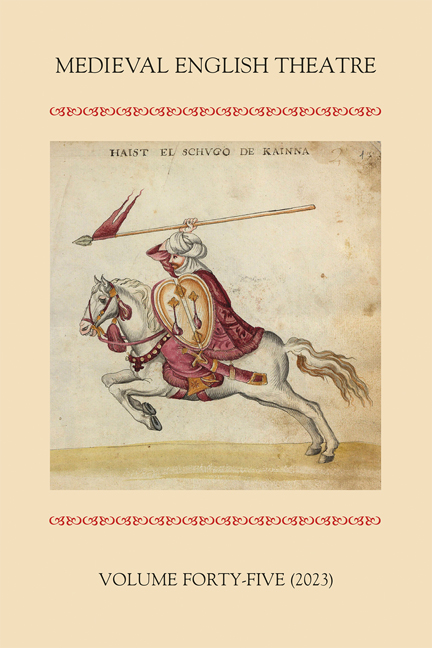Book contents
- Frontmatter
- Contents
- Illustrations
- Notes on Cover Image and Online Links
- Common Abbreviations
- Editorial
- John Blanke’s Hat and its Contexts, Part 1: Turbans and Islamic Dress at the Court of Henry VIII
- Disjointed Unison: Bodily Porousness and Subversion in the Croxton Play of the Sacrament
- The Disabled Body as Performance: ‘Disabled’ Performers in the Records of Early English Drama
- From Huy to Primrose Hill: An Early Twentieth-Century English Re-Playing of a Fifteenth-Century Liégeois Nativity Play
- ‘More medieval morality play than 21st century’: Spectacle and its Meaning at the Coronation of King Charles III
- The Seven Sages of Scotland: The Scottish Storytelling Centre, Edinburgh, Saturday 22 July 2023
- Editorial Board
- Submission of Articles
‘More medieval morality play than 21st century’: Spectacle and its Meaning at the Coronation of King Charles III
Published online by Cambridge University Press: 08 May 2024
- Frontmatter
- Contents
- Illustrations
- Notes on Cover Image and Online Links
- Common Abbreviations
- Editorial
- John Blanke’s Hat and its Contexts, Part 1: Turbans and Islamic Dress at the Court of Henry VIII
- Disjointed Unison: Bodily Porousness and Subversion in the Croxton Play of the Sacrament
- The Disabled Body as Performance: ‘Disabled’ Performers in the Records of Early English Drama
- From Huy to Primrose Hill: An Early Twentieth-Century English Re-Playing of a Fifteenth-Century Liégeois Nativity Play
- ‘More medieval morality play than 21st century’: Spectacle and its Meaning at the Coronation of King Charles III
- The Seven Sages of Scotland: The Scottish Storytelling Centre, Edinburgh, Saturday 22 July 2023
- Editorial Board
- Submission of Articles
Summary
On 6 May 2023, as I sat down on my couch to watch King Charles III's coronation, I cannot say that I was especially excited about it. I am not from the United Kingdom and did not feel particularly engaged by an event that I perceived to be closely tied to that country and culture. However, I was curious enough to turn on the television that morning: the fashion would undoubtedly be interesting (would the hats be even more wonderful than those seen at royal weddings?) and it would be fun to spot our own Swiss president sitting in Westminster Abbey. As the ceremony started, my excitement rose and I found myself wanting to see the crown jewels, all the gold and the wealth on display, and museum pieces worn again. I was eager to listen to the music, some of which – like Handel's Zadok the Priest – I was aware had been composed for similar ceremonies in the past. Spectacle (defined here as ‘stage display or pageantry’) was therefore the primary draw for me to watch King Charles III's coronation. I was intrigued because the event was beautiful and unique, but also because I felt I was watching, in some ways, a recreation of a historical spectacle.
Yet, was the coronation not more than this spectacle? Was it even as ‘historical’, and perhaps medieval, as I felt it was when I was watching it? What was its meaning and how was it expressed through spectacle? Prompted by these questions, this article reflects on the meaning of this twenty-first century coronation and on its evolution over its 1,000-year history. It will do so by exploring the discourse around the coronation of King Charles III and by comparing the features of this royal event with those of its medieval antecedents. Both the perception of the coronation, and the choices that were made during its organisation reflect the current – and the changing – view of kingship. I will first examine the meaning of the coronation as it was explained by those involved in planning and enacting it; I will then move on to consider the extent to which the intended meaning was understood, appreciated, or embraced by the recipients, the spectators of the event.
- Type
- Chapter
- Information
- Medieval English Theatre , pp. 153 - 185Publisher: Boydell & BrewerPrint publication year: 2024



